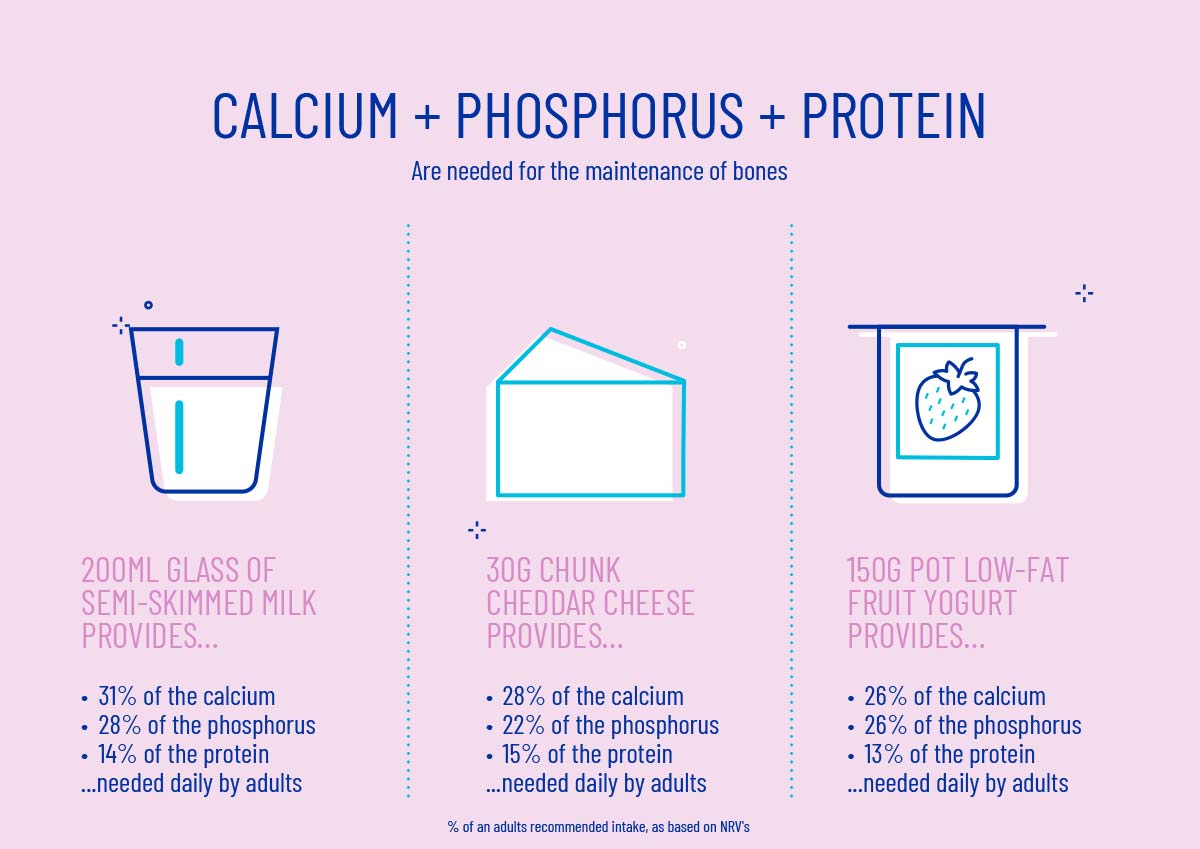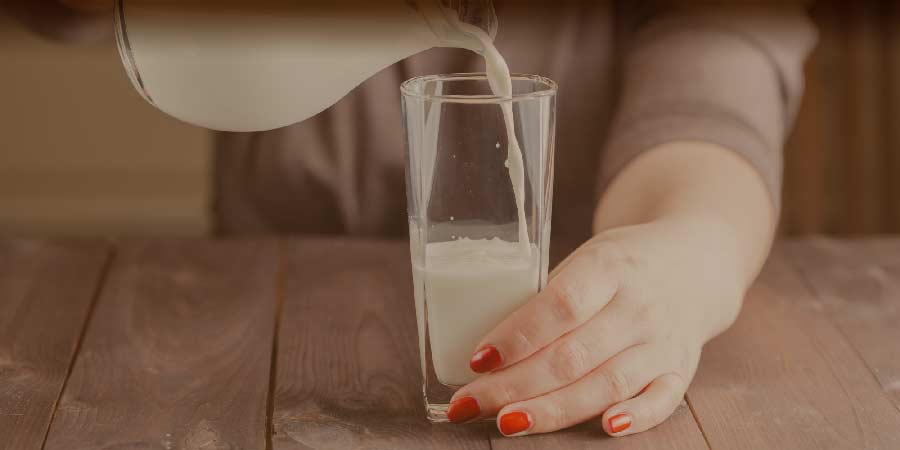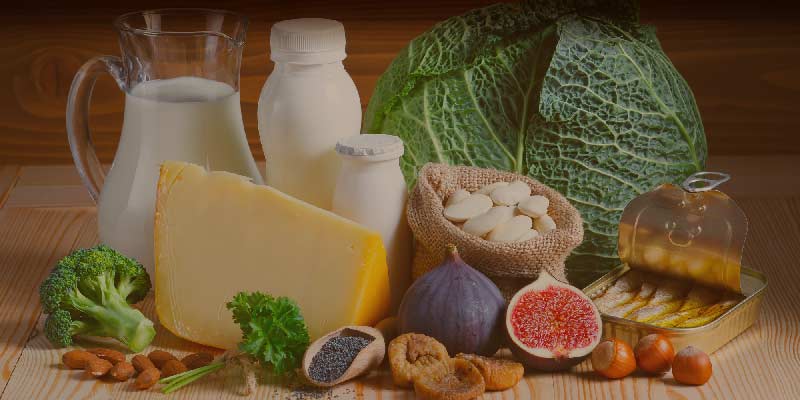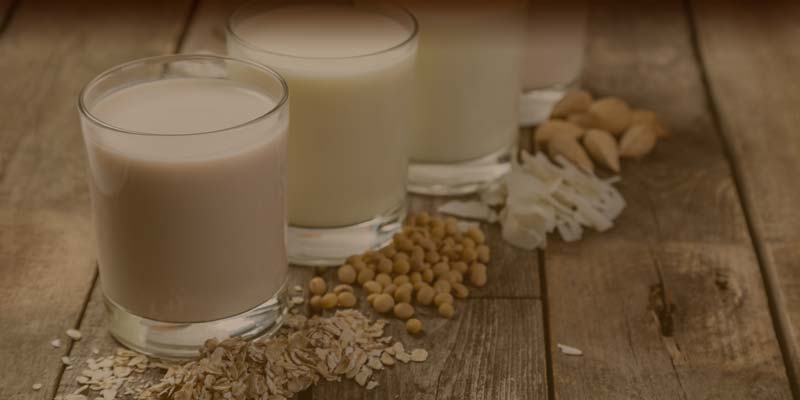
It’s a myth that women need to eat for two when they’re pregnant. In fact, requirements for calories stay the same for the first six months of pregnancy – it’s only in the last trimester that an extra 200kcal a day is recommended! The need for protein and some other nutrients such as vitamins A, C and some B vitamins increases a little throughout pregnancy, but a balanced, healthy diet should be able to meet these needs.
Dairy products are a great choice for achieving some of the extra calories needed in the last three months of pregnancy as they come naturally packaged with many other nutrients too.
Take 200 calories (roughly!)…
200ml glass semi-skimmed milk (95kcal)
+
1 large (120g) banana (97kcal)
=
192kcal
30g Cheddar (125kcal)
+
1 small slice lightly buttered wholemeal toast (80kcal)
+
1 tomato (15kcal)
=
220kcal
150g pot low-fat fruit yogurt (117kcal)
+
Bowl of fruit salad (83kcal)
=
200kcal
Worried about drinking milk in pregnancy or wondering about eating dairy in pregnancy? Don’t be. Milk, cheese and yogurt have the advantage of being rich in calcium, which is needed for the normal growth and development of bone in children. Although requirements for calcium don’t increase during pregnancy, almost one in 10 women have very low intakes. Vitamin D helps the body to absorb and use the calcium from food, so the NHS recommends all women who are pregnant consider taking a daily 10mcg supplement of vitamin D throughout their pregnancy.
Milk and yogurt are also important providers of iodine in our diet, which contributes to the normal growth of children. Again, requirements don’t increase during pregnancy but more than one woman in 10 has very low intakes of this nutrient so could be at risk of a deficiency.
“Low intake of iodine during pregnancy may affect development of the baby’s brain. This could have consequences in later life such as lower IQ or reduced reading ability”
British Dietetic Association
Q: What dairy products can I eat when pregnant?
You can eat most dairy products when you’re pregnant. Always have pasteurised milk and make sure yogurt and cheese is made from pasteurised milk – this is the case for most products bought from supermarkets but check labels on packaging to make sure. Hard cheeses like Cheddar, and Wensleydale, and soft cheeses such as cottage cheese, cream cheese and processed cheese spreads are all fine to eat. You should avoid mould-ripened soft cheeses with a white coating on the outside such as brie and camembert, and blue cheeses as they may be more likely to carry listeria bacteria. However, you can use those cheeses in cooking as listeria is killed by high temperatures. Just make sure they’re cooked until they are steaming hot.
For more information on what you can eat and what to avoid during pregnancy visit the NHS website.
Healthy Start
To help give children a good nutritional start in life, the Government runs the Healthy Start Scheme. It allows pregnant women and parents with young children on low incomes to exchange vouchers for free milk, fruit, vegetables and infant formula. The vouchers can be used in shops taking part in Healthy Start, and with local milkmen. You can also get free vitamins. To find out more about Healthy Start ask your health visitor, or visit www.healthystart.nhs.uk
Women trying for a baby (ideally for 3 months before becoming pregnant) and in the first 12 weeks of pregnancy are advised to take a 400mcg supplement of folic to help reduce the risk of neural tube defects such as spina bifida
BREASTFEEDING
Breastfeeding mums are feeding their baby as well as themselves so needs for calories and most nutrients at this time of life shoot up. For example, breastfeeding mums need around an extra 500kcal a day to produce a good quality breast milk for their rapidly growing baby.
The need for protein when breastfeeding also increases – in the first four months roughly a quarter more protein is needed than usual. It’s really important to get enough, as protein is needed for the normal growth and development of children’s bones, and helps muscles to grow.
Dairy products such as milk, cheese and yogurt are a great choice for providing protein and come naturally packaged with many other nutrients women need more of when breastfeeding. In fact, needs for most vitamins and minerals increase – often by a lot – and dairy can help to provide these. For example, calcium and phosphorus requirements almost double. It’s important to meet these extra needs because like protein, these are both vital for the normal growth and development of bone in children. Breastfeeding mums should also consider taking a daily 10mcg supplement of vitamin D. This vitamin helps our body to absorb and use the calcium we get from our diet.
It’s also important to get enough iodine whilst breastfeeding as this nutrient is needed for children to grow properly.
Fluid requirements also increase – a lot goes into making breast milk, which helps to keep babies hydrated as well as fed. It can mean breastfeeding mums are more likely to get dehydrated so it’s vital to drink more. Milk is a great choice as it can help meet the increased needs at this time for both fluid and many nutrients.
“A healthy diet includes drinking plenty of fluids – have a drink beside you when you settle down to breastfeed: water, lower fat milks, lower sugar or sugar-free drinks all good choices.”
NHS
Healthy Start
To help give children a good nutritional start in life, the Government runs the Healthy Start Scheme. It allows pregnant women and parents with young children on low incomes to exchange vouchers for free milk, fruit, vegetables and infant formula. The vouchers can be used in shops taking part in Healthy Start, and with local milkmen. You can also get free vitamins. To find out more about Healthy Start ask your health visitor, or visit www.healthystart.nhs.uk
For more information on diet when breastfeeding visit the NHS website here.
Last reviewed: 03/2021
Next review due: 03/2023











